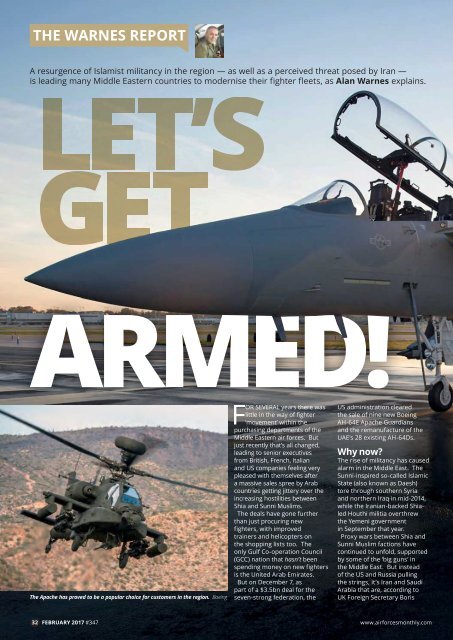Airforces Monthly - February 2017
You also want an ePaper? Increase the reach of your titles
YUMPU automatically turns print PDFs into web optimized ePapers that Google loves.
THE WARNES REPORT<br />
A resurgence of Islamist militancy in the region — as well as a perceived threat posed by Iran —<br />
is leading many Middle Eastern countries to modernise their fighter fleets, as Alan Warnes explains.<br />
LET’S<br />
GET<br />
ARMED!<br />
The Apache has proved to be a popular choice for customers in the region. Boeing<br />
FOR SEVERAL years there was<br />
little in the way of fighter<br />
‘movement’ within the<br />
purchasing departments of the<br />
Middle Eastern air forces. But<br />
just recently that’s all changed,<br />
leading to senior executives<br />
from British, French, Italian<br />
and US companies feeling very<br />
pleased with themselves after<br />
a massive sales spree by Arab<br />
countries getting jittery over the<br />
increasing hostilities between<br />
Shia and Sunni Muslims.<br />
The deals have gone further<br />
than just procuring new<br />
fighters, with improved<br />
trainers and helicopters on<br />
the shopping lists too. The<br />
only Gulf Co-operation Council<br />
(GCC) nation that hasn’t been<br />
spending money on new fighters<br />
is the United Arab Emirates.<br />
But on December 7, as<br />
part of a $3.5bn deal for the<br />
seven-strong federation, the<br />
US administration cleared<br />
the sale of nine new Boeing<br />
AH-64E Apache Guardians<br />
and the remanufacture of the<br />
UAE’s 28 existing AH-64Ds.<br />
Why now?<br />
The rise of militancy has caused<br />
alarm in the Middle East. The<br />
Sunni-inspired so-called Islamic<br />
State (also known as Daesh)<br />
tore through southern Syria<br />
and northern Iraq in mid-2014,<br />
while the Iranian-backed Shialed<br />
Houthi militia overthrew<br />
the Yemeni government<br />
in September that year.<br />
Proxy wars between Shia and<br />
Sunni Muslim factions have<br />
continued to unfold, supported<br />
by some of the ‘big guns’ in<br />
the Middle East. But instead<br />
of the US and Russia pulling<br />
the strings, it’s Iran and Saudi<br />
Arabia that are, according to<br />
UK Foreign Secretary Boris<br />
32 FEBRUARY <strong>2017</strong> #347<br />
www.airforcesmonthly.com


